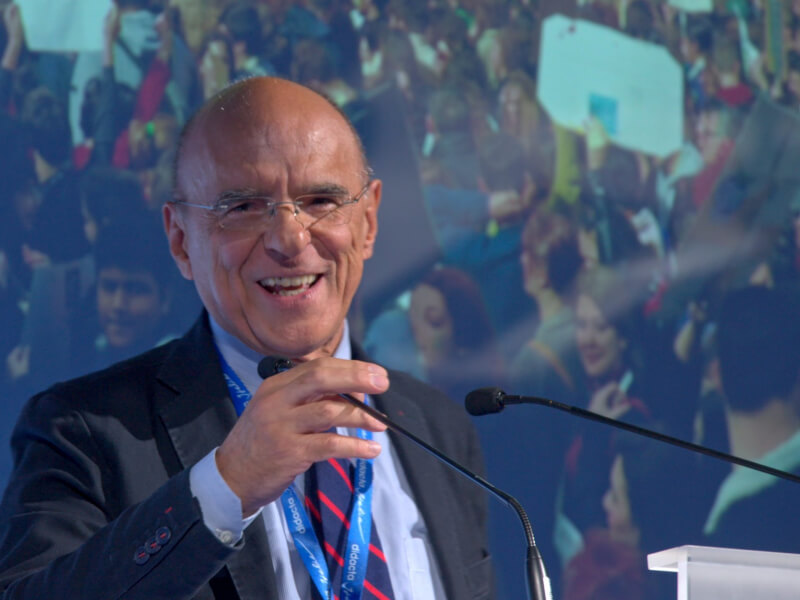13 January 2024 – Embracing a journey that spans academia, corporate culture shifts, citizen activism, and a deep commitment to sustainability, David Korten’s narrative is one of inspiration and evolution. His trajectory, from joining an MIT faculty seminar on the Limits to Growth computer model in 1973 to becoming a dedicated advocate for sustainable and equitable economic principles, culminated in his membership in The Club of Rome.
A pivotal shift in perspective
Korten’s critical view of economic theory began with a pivotal moment at the Harvard Business School. As a faculty member, he found himself immersed in what became a global corporate culture transformation—from a business commitment to serving all stakeholders to a laser focus on maximising short-term profits. This shift propelled him to leave the Harvard Business School faculty and accept a position at the Harvard University Institute of International Development (HIID), a hotbed of neoliberal development economists.
At HIID, Korten learned of previously unencountered perspectives. He was stunned, for example, when he heard his HIID colleagues express their view that South Korean farmers contributed nothing to South Korea’s development because they only fed the South Korean people and were producing little or nothing for export. Hearing such perspectives fuelled his growing disdain for the prevailing economic ideologies and strengthened his resolve to advocate for a more sustainable and just world.
Many years later, after participating in an annual meeting of The Club of Rome in Santiago, Chile, he officially became a member. The Club of Rome, with its focus on addressing global challenges and fostering sustainability, became a platform for Korten to channel his passion and dedication.
Unpacking global challenges and advocacy
Korten’s extensive body of work, including the influential When Corporations Rule the World, delves into the perils of corporate-driven globalisation. His critique extends beyond the misnomer of “multinational” corporations. He advocates breaking up “transnational” corporations and converting them to cooperative worker/community ownership.
His vision extends beyond mere critique. Korten champions the concept of “Living Economies,” favouring economic systems that mirror the resilience and adaptability found in natural ecosystems. This aligns seamlessly with The Club of Rome’s mission to address global challenges by emphasising the interconnectedness of peace, equality, and environmental health.
The Club of Rome’s integrative perspective
As a member of The Club of Rome, Korten actively participates in initiatives such as the “From Emergency to Emergence” framework in collaboration with fellow members like Sandrine Dixson-Declève and Mamphela Ramphele. He believes that to organise around creating the future we seek, we need a clear set of framing principles and an evocative name. For him, the Earth Charter, crafted through history’s most inclusive and participatory drafting process, provides an appropriate set of principles for a future of equality, environmental care, and peace. Ecological Civilisation provides an established and evocative name with a rapidly growing constituency.
In addressing urgent global challenges, Korten believes The Club of Rome’s distinctive contribution is its integrative perspective. By acknowledging the interdependence of peace, equality, and environmental health, The Club of Rome stands poised to make significant strides towards comprehensive solutions.
Interdisciplinary collaboration and the role of academia
Korten’s advocacy extends to the importance of interdisciplinary collaboration. His viewpoint aligns with The Club of Rome’s emphasis on systems thinking and interdisciplinary approaches. As a former academic himself, Korten recognises the potential role of educational institutions in driving positive change. He advocates confining the teaching of neoliberal ego-nomics to the history department while embracing a new eco-nomics with an interdisciplinary perspective featuring the life sciences.
A unified vision for the future
Looking ahead, Korten expresses his hopes for The Club of Rome’s impact on global issues. He urges it to remain steadfast in its focus on shifting the economic paradigm from GDP growth to securing the wellbeing of people on our finite living Earth. In emphasising the big picture and avoiding distractions, Korten underlines the importance of being more, not having more.
In essence, David Korten’s journey—from academic corridors to corporate transformation and advocacy within The Club of Rome—tells a story of evolution, commitment, and a collective vision for a more sustainable and just world. His narrative resonates with the harmonious goals of The Club of Rome, making him a key player in the organisation’s pursuit of global change.






